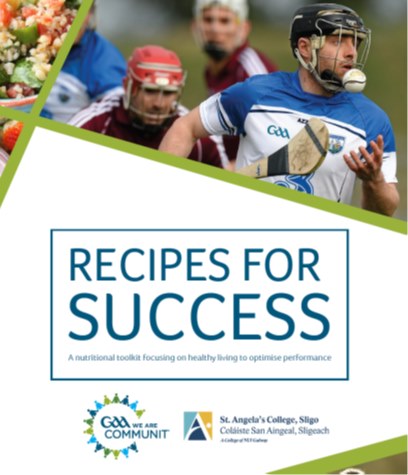Safety & Wellbeing
The GAA has developed a number of resources in recent years as a reference for student players to aid them in their preparation, performance and recovery throughout the season. Favourite or Star this link as a reference for throughout the season. The GAA has also recently published an updated.
Prepare
Warm Up
Preparation is crucial to achieving maximum performance. There are many things you can do, as a player, and, as a team, to ensure you are ready for throw-in….
The GAA15 has been developed as a result of research from an analysis of the injury data collected by the GAA/UCD National Injury Surveillance Database and a review of high quality studies of exercise training for injury prevention worldwide.
Injury Prevention
GAA15 has been recently shown in a study carried out in IT Carlow, that when implemented correctly, to have reduced lower limb injuries in training by 45% and injuries in matches by 29% when compared with a group who carried out their normal warm up.
Further information including instructional videos,coaching guides and and a full demonstration are available at http://learning.gaa.ie/Gaelic15
Injury Prevention
Injury Prevention Methods
Injury is a common aspect of sports participation. Injuries may be acute (occur in a single event (broken bone, hamstring tear), or from overuse and occur over time and not necessarily obvious (e.g. shin splints). Symptoms for overuse injuries may not be obvious.
In addition to the GAA15, there are other injury prevention methods to help reduce your risk
of injury:
- Always cool-down/stretch after training
- Avoid Overtraining
- Recover properly from exercise
- Replace fluids and energy
- Be familiar with the PRICE Model (for soft tissue injuries)
Overtraining Symptoms
Being potentially involved in mutliple teams across one, two or multiple sports can lead to overtraining.
If you are experiencing any/some of the following symptoms it might be time to consider taking a night off or consulting with your manager(s).
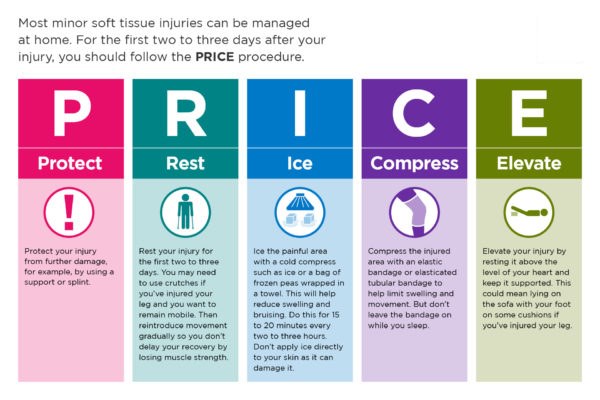
Nutrition & Hydration
Gaelic Games are high intensity sports and demand a wide range of physical and mental attributes in order to maximise performance. Performance utrition provides the body with appropriate fuel and nutrient sources to train and recover optimally.
The Recipes for Success booklet (free and available for download) is filled with tasty, healthy, performance enhancing recipes that are easy to make – aims to support GAA players and members in making the right choices in preparation, for performance and in recovery. For students away from home, cooking is a skill you will need to master during college – you won’t be able to survive on chicken-fillet rolls and fast food for 4 years!
Performance may be impaired in some players who are dehydrated before a training sessionor game, or who drink nothing or little during exercise.
Perform
Concussion
- Concussion is a brain injury that needs to be taken seriously to protect the long term welfare of all players
- Any player suspected of having sustained a concussion, should be removed immediately from the field and should not return to play on the same day.
- Where a Team Doctor is present, he should advise the person in charge of the team i.e. the Team Manager, in this regard and the player must not be allowed to continue his participation in the game.
Concussion is an evolving injury therefore it is important to monitor the player after the injury for progressive deterioration.
- Concussion diagnosis is a clinical judgement – A player suspected of having a concussion should be brought to a doctor for assessment ASAP. following the incident.
- Players must receive medical clearance (by a doctor) before returning to play.
Signs & Symptoms
| Headache or Pressure in Head | Nausea or Vomiting | Balance or Dizziness |
| Double or Blurry Vision | Sensitivity to light | Feeling Groggy |
| Concentration / Memory Problems | Confusion | Not Feeling Right |
Fortunately 95% of people who suffer concussion, with correct management, make a full recovery within 3 weeks. Awareness of the dangers and management of a concussion is the key. For more information on Concussion including an in-depth e-learning course see learning.gaa.ie/Concussion
If you recognise symptoms of concussion yourself or in a team mate be sure to advise any medical personnel(if present)/coach or mentor and insist that the player in question is removed from play immediately.. Concussion has potentially fatal consequences. A second concussion soon after an initial oncussion event can cause the brain to swell within the skull causing a long term brain injury or fatality.
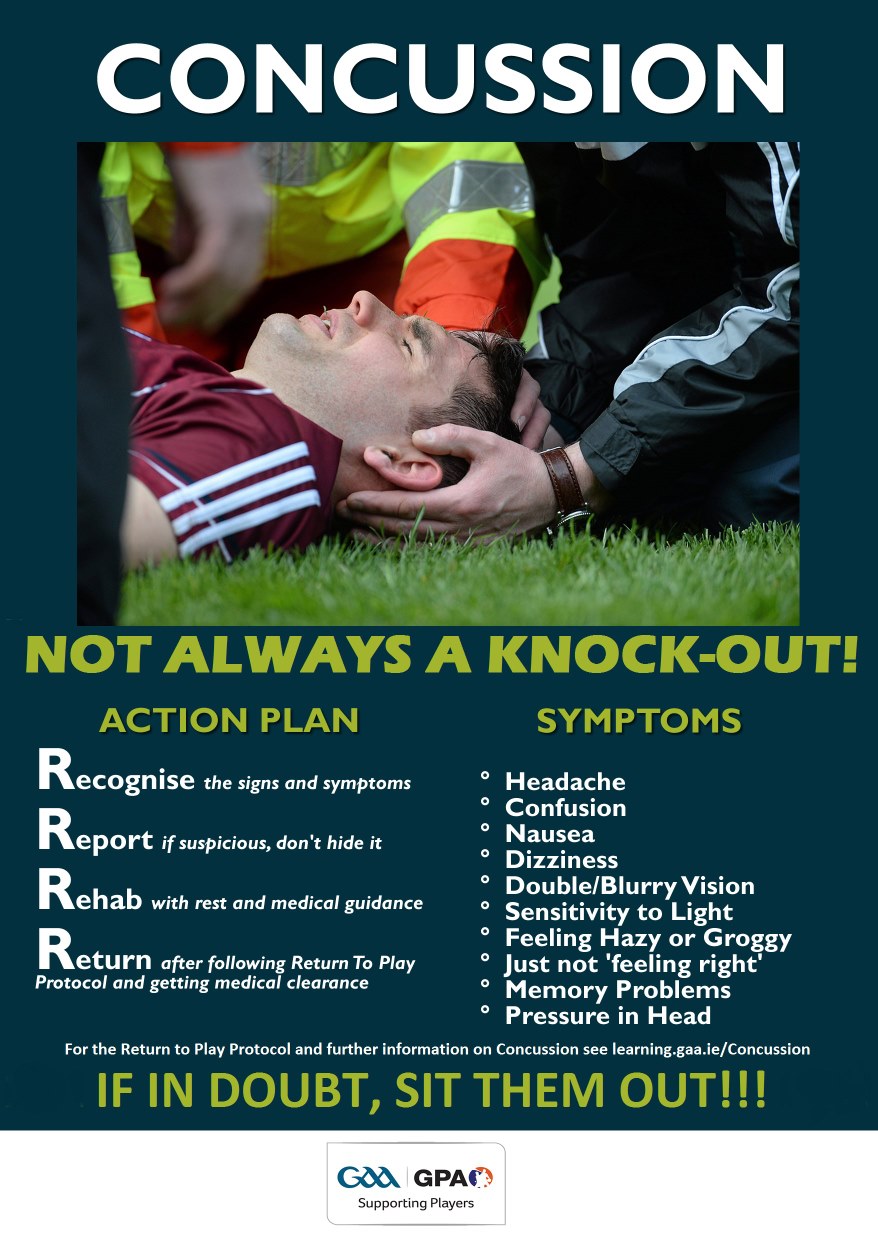
Wellbeing
Mental Health
Mental health describes how we think and feel about ourselves and others and how we interpret events in everyday life. It also relates to our ability to cope with change, transition, significant life events and the stress that often comes our way. Mental health refers to the emotional resilience to be able to enjoy life and to survive pain, disappointment and sadness, and to the level of belief in your own and others’ dignity and worth.
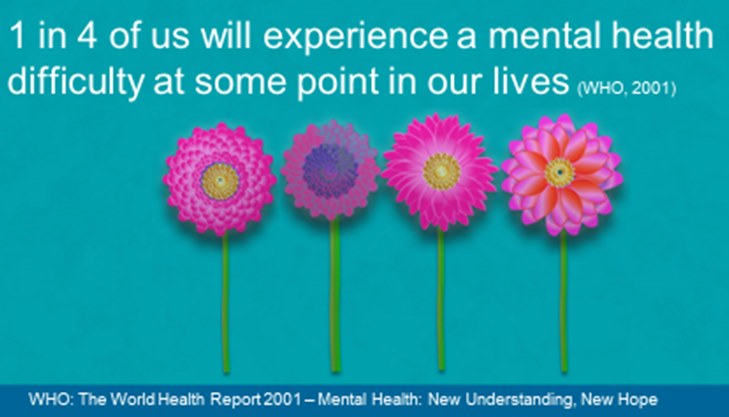
If something is not right – speak up! Most campuses have many student support services which can assist you in relation to academics, accommodation, financial, medical or wellness issues. Your GAA development officer will be able to signpost you to the appropriate service. A burden is always lighter when shared.

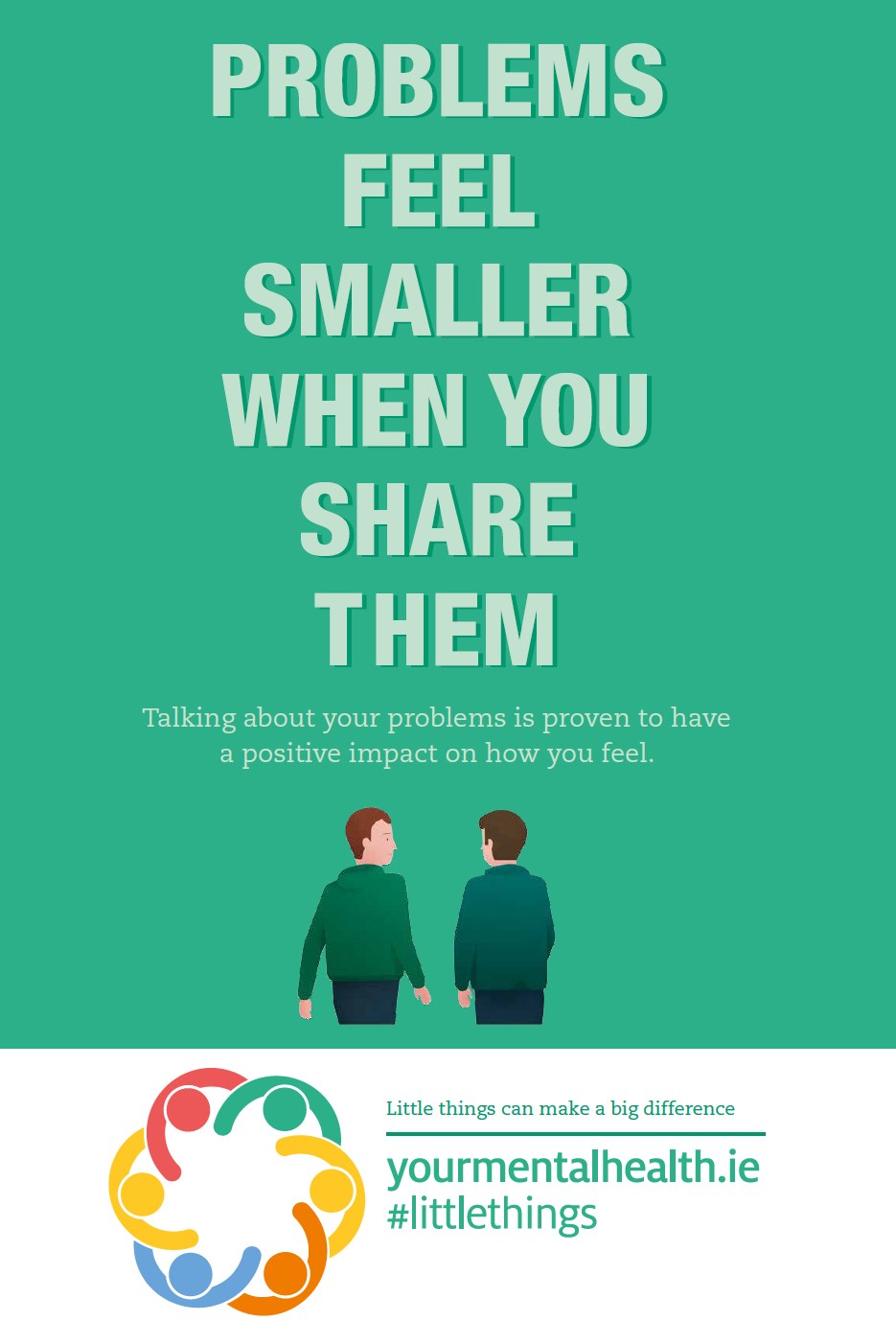
Also look out for friends who may be going through a tough time. If a friend seems distant catch up with them.
You can help by:
- Asking open questions about how they are feeling.
- Talking gently about your concerns and the things you have noticed.
- Giving them time and space to tell you about what they are going through.
- Listening carefully to their responses, without being judgmental or offering solutions.
- After you hear them out, make your decision about how serious you think the problem is and whether you need to encourage him or her to get professional support.
Alcohol and Sports Performance
The social side of Gaelic Games is very important and celebrating with team members after a match is a tradition in some clubs. However, if your celebrations involve drinking alcohol and especially if you drink to the point where you get drunk, this can seriously affect your fitness. If you take your sport seriously, and like to do the best you can for yourself and your team, it’s worth knowing the facts and what you can do to reduce your risk of poor performance.
Effects of alcohol on your performance
Greater risk of muscle cramps
Greater risk for injuries
- Reduced endurance:
- Slower reactions
- Dehydration
- Reduced aerobic performance
- Muscle injury
So, no matter how much training and conditioning you’ve put in, drinking up to 72 hours before a match will take the edge off your fitness. If you want to be the very best you be at your sport you’ll have more of a chance of achieving that by not drinking alcohol. However if you do want to drink it’s best to drink a little and not too often. For more information visit https://www.gaa.ie/news/the-gaa-asap-programme/
Recovery
Sleep and Nutrition
Nutrition, Hydration, Sleep, Active Cool Down/ Stretch, Massage/Foam Rolling are all important means of recovery from training in advance of and after training and fixtures.
The most important aspects of recovery are sleep and nutrition (which we have covered already).
Simple Sleep Advice
- Napping is ok for less than 45 minutes. Any longer and it can be detrimental to your nightime sleeping.
- Avoid Caffeine 3-4 hours before bed.
- Avoid all screens 90 minutes before bed.
- Keep your room well ventilated, quiet, dark, cool and SCREEN FREE!
- If stressed, try writing down stressful thoughts before bed to allow you to switch off.


